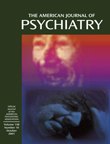To the Editor: Given the research identifying the existence of memory deficits in people with chronic combat-related posttraumatic stress disorder (PTSD)
(1), it is not surprising that so many veterans complain of memory difficulties
(2). Unfortunately, there are few data on the relationship between subjective and objective memory deficits. We examined archival data to evaluate this relationship.
Data came from 129 consecutive male veterans seen at the Central Arkansas Veterans Healthcare System’s PTSD Evaluation Program. After a psychiatric interview in which the diagnosis of PTSD was confirmed, all patients completed a program assessment, which consisted of a number of clinician-administered and self-report evaluations and measures of intelligence and memory, as well as a measure of subjective memory. The patient group had a mean age of 52 years (SD=7) and a mean education level of 12 years (SD=2). An abbreviated form of the WAIS-R yielded scores within the average range (full-scale IQ: mean=97, SD=11; verbal IQ: mean=96, SD=11; performance IQ: mean=99, SD=13). Likewise, a score falling within the average range was generated on a measure of immediate verbal memory, the memory index of the Wechsler Memory Scale III
(3) (mean=90, SD=17).
Psychopathology was measured with the Beck Depression Inventory (mean score=28, SD=9), the Brief Symptom Inventory
(4) (mean global severity index=2.4, SD=0.5), the Dissociative Experiences Scale
(5) (mean score=26, SD=15), and the Mississippi Scale for Combat-Related PTSD
(6) (mean score=128, SD=17). Subjective memory was assessed with the Everyday Memory Scale
(7) (mean score=103, SD=51).
The veterans’ Everyday Memory Scale scores were not significantly correlated with the verbal memory index (r=–0.05, N=105, p=0.60), nor were they significantly correlated with any of the IQs (full-scale IQ: r=–0.18, N=105, p=0.06; verbal IQ: r=1.19, N=105, p=0.054; performance IQ: r=–0.16, N=105, p=0.11). The Everyday Memory Scale, however, was significantly correlated with each of the measures of psychopathology: the Beck Depression Inventory (r=0.48, N=105, p<0.001), the global severity index from the Brief Symptom Inventory (r=0.53, N=105, p<0.001), the Dissociative Experiences Scale (r=0.34, N=105, p<0.001), and the Mississippi Scale for Combat-Related PTSD (r=0.42, N=105, p<0.001). This pilot study, derived from archival data, suggests that self-reports of poor memory may not reliably reflect the degree of memory impairment these veterans experience. Rather, such self-reports may be effective indicators of emotional distress. Control for substance abuse and other comorbid diagnoses, as well as the addition of a more thorough evaluation of memory functioning, would help to determine the accuracy of these findings.

